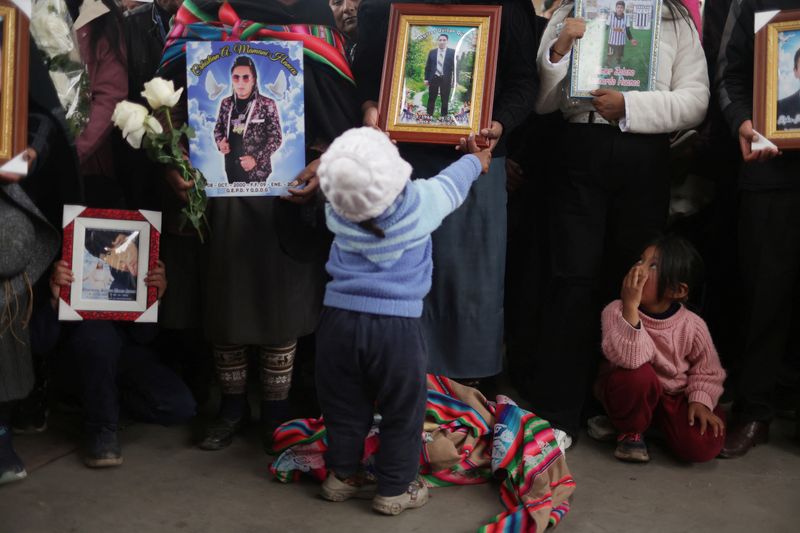By Alexander Villegas
JULIACA, Peru (Reuters) - Thousands of demonstrators marched through Peru's southern city of Juliaca on Thursday to commemorate the one-month anniversary of clashes that left 19 people dead in the city, the worst violence in over two months of anti-government protests.
Family members and protesters amassed under an overpass for a memorial to the victims after marching past concrete road barriers still pockmarked with bullet holes and the shuttered airport guarded by soldiers and police.
The town in the Andean region of Puno has been rocked by protests since the Dec. 7 ouster of leftist President Pedro Castillo. Clashes on Jan. 9 left 18 dead, including one police officer. Another protester died days later.
The violence was the single deadliest day in the protests that themselves mark the worst unrest Peru has seen in over 20 years, posing an immense challenge to the new government in Lima and threatening mining operations in the world's no. 2 copper producer.
On Thursday, as families mourned the dead, some protesters in other cities joined calls for a wider national strike. Military aircraft occasionally flew overhead as the ceremony commemorating the victims took place.
"The Puno region really came out in support, we're not one, we're many," said Ruth Meza, who said her classmate Elmer Solano was killed in the Juliaca clashes.
Peru's southern Andes, the focal point of the protests, is home to the famous Incan ruined city of Machu Picchu and huge reserves of copper, but lags behind much of the country in education, health and income levels.
The jailed Castillo, a former teacher and union leader, retains support among many such communities, who are demanding constitutional change and an overhaul of Congress, as well as his release.
MASS FOR PROTEST DEAD
Luis Zambrano, a priest who conducted a mass for family members on Wednesday, said that while protesters were sometimes violent, he believed authorities reacted with too much force.
"They didn't come to calm the waters," he said.
During Zambrano's mass, a display table with photos of those who died in the protests quickly overflowed and had to be rearranged as more family members arrived, with crowds spilling out of the church.
Family members of those who lost their lives met with lawyers and the local ombudsman after the mass. They said they wanted to seek justice from a government which had done little to aid them.
Nivardo Enriquez, the ombudsman, said his office was working with the local prosecutor to provide evidence, testimonies and autopsy reports.
"(The prosecutor's office) is doing its job," Enriquez said. "And we hope it's being done with the corresponding speed."
Dionisio Aroquipa told Reuters his 17-year-old daughter Jhamileth Nataly had been killed in the protests. Reuters was not able to immediately confirm the details of his account.
"Those who were protesting have been caught, they've been investigated. But for the deaths? There's practically no justice," said Aroquipa.

He said his daughter, a psychology student in Bolivia, volunteered at an animal charity and hoped to travel to Brazil and Argentina.
"She had dreams," Aroquipa said. "But when it comes to investigation into what happened to my daughter, you don't see any progress."